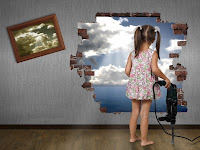How to be both original and universal
What exactly do we mean when we talk about 'originality'?
The ability to think independently? Being new or inventive? Most certainly –
but for the creative, this definition has its challenges - to be truly unique you have to be aware of everything that has
gone before in order to be certain of your uniqueness. When Paul McCartney woke
up with the tune 'Yesterday' in his head he was so unsure that he hadn't just
heard it somewhere else that he phoned George Martin (and everyone else he knew
in the music business) to check.
Same, same but different
It's even more complicated than that. This definition
ignores the fact that what people really mean when the say something is 'original'
is that it has all the themes, structures or mechanisms expected of
the medium but presents them in a new and fresh way. If Sir Paul had just
plonked a load of random keys on his piano without thought for melody, rhythm
or cadence he might have come up with
something new, but it wouldn't have been considered music, let alone original.
So what does this mean for us writers? How can we hope to
find the delicate pathway that will lead us to originality? The short answer
is, look within.
Don't Imitate
We've all been guilty of it. There are several novels and
plays that I wish I'd written myself – and it's fair to say that all of these
works were original in some way. The fact that I wish I'd written them is
testament to the fact that there's no point in trying to imitate them because
they have already achieved what I can only hope to – originality. Don't get me
wrong, there's definitely stuff I can learn from imitating those guys, but
originality isn't one of them. The best I could hope for is pastiche, the worst
a travesty – we need to look elsewhere.
There is nothing new under the sun
While the biblical statement may be arguable – the case is already
closed for plots. The guys who know say there are only 36 dramatic situations
and 7 basic plots - it's already been covered. You can stick a twist in, or
subvert a convention – but you're not being original, you're just being gimmicky.
Originality doesn't lie in the plot – it lies in who the plot happens to (what
some writers call the real 'story'), how it happens to them, what it means to them and what they end up
doing about it.
Don't be afraid of the power
You see, the only thing that is genuinely original about any
creative enterprise is yourself. It's tapping into your view of the world as
you've experienced it that will provide originality – but (and here's the real
big deal) also universality. We've all felt love, hate, despair and joy – and your
love, hate, despair and joy will feel an awful lot like mine – but it will be
different – because I'm not you and I wasn't there with that person you loved
or hated at that particular time.
But I'm not my characters, you cry – how the hell can I
invest them with the originality of my experience and view? Simple (ahem),
first you discover yourself, you examine your experience, you exercise your
voice and means of expression – you understand who you are and the world you've
seen. Then you ask yourself, if I was my character, what would I do in that
dramatic situation I've put them into?
Trust yourself. Then you'll be original.



I'm often chatting to my characters when performing mundane chores. Thank you for confirming that I'm not mad. It's good to talk :-)
ReplyDeleteGreat post, James.
Thanks, Hem.
Delete